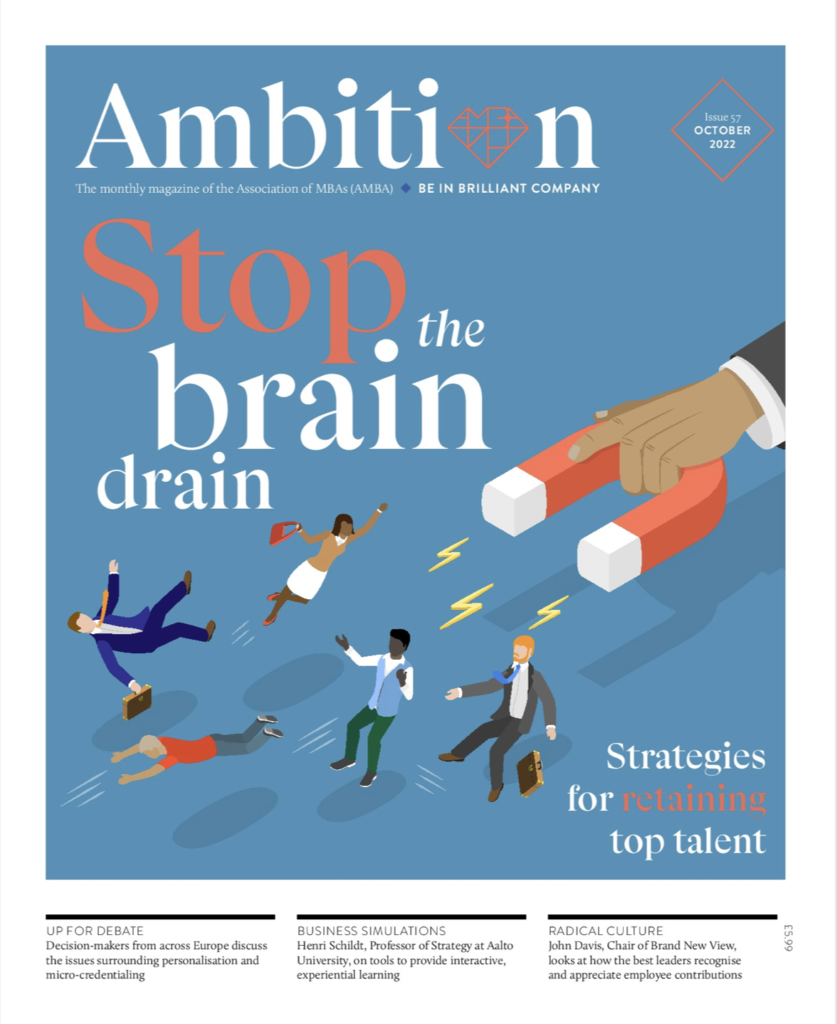
MBM admissions remain in good health worldwide
Far from going into freefall from Covid-19’s impact, the business master’s landscape is in good health, according to AMBA & BGA research. Tim Banerjee Dhoul and Ellen Buchan report


Since the Covid-19 pandemic hit back in early 2020, there has been a lot of discussion about the new organisational cultures required in business schools – particularly, the need for more distance learning and online courses.
Little, however, has been said about how schools will have to adjust to these new circumstances. In this article, we will look at some of the changes that business schools must make in order to meet the needs of today’s employees, students, and academic staff.
The Great Resignation refers to the higher-than-usual number of employees voluntarily leaving their jobs, and changing their everyday routine. It is currently taking place as a result of Covid-19.
Due to the uncertainty, and also new opportunities, many people have quit their jobs and are moving to new roles and/or locations. This trend is also a sign of the times. People are no longer prepared to put up with unpleasant bosses, long commutes, or hectic lives.
They are seeking a better quality of life and are often finding it outside of the regular workforce. Business school curricula and organisational cultures must be revised therefore to reflect these changing cultures.
Covid-19 has disrupted the workforce in ways that are still unfolding. But even before the outbreak, companies were contending with a war for talent. The good news is that many top workers are willing to jump ship for the right opportunity. The bad news is that it is hard to find qualified employees – and even harder to retain them.
One recent example is the departure of Jeff Weiner from LinkedIn. Weiner was one of the most sought-after executives in Silicon Valley, and his resignation sent shockwaves through the tech industry. LinkedIn was able to find a replacement quickly, but it shows just how competitive the job market has become.
Employers are having to get ever-more creative in order to attract and retain top talent. For example, some are offering more flexible working arrangements, while others are opting to increase pay and benefits.
Business schools around the world have been expressing concerns about the career prospects of their graduates – but what about the careers of the staff and faculty? There have been media reports of a staff exodus in the higher education sector. The University and College Union warned that demoralised and burned-out academics are leaving UK universities. According to Inside Higher Ed’s 2022 Survey of College and University Chief Academic Officers, 19% of provosts say that faculty members are leaving at significantly higher rates than in the past.
The pandemic has also had a major impact on business school faculty. Many professors have lost their jobs due to budget cuts, or because they are unable to teach online classes. A ‘Great Switch’ is also evident in many schools. Faculty are switching to portfolio careers, preferring freedom to working solely for one organisation. Others have decided to retire early due to the uncertain future of academia. This leaves business schools with a shortage of qualified instructors.
The globalisation of business has led to an increased demand for faculty with international experience and expertise. Business schools have responded by recruiting more international faculty. However, the growing popularity of hybrid programmes is making it harder for schools to attract and retain international faculty, other than for occasional online work.
Many schools are now offering hybrid programmes that combine online and in-person learning. The online component allows students to learn at their own pace, while the in-person element provides the opportunity for face-to-face interaction with professors and classmates. This combination has proved popular among students, who appreciate the flexibility and convenience that online learning offers.
However, the trend is also causing problems for business schools. International faculty are less likely to want to teach in a hybrid programme because it does not allow them to spend enough time with their students. Hybrid working may also lead to burnout and exhaustion as many schools try to be all things to all people – to all their students and all clients.
There is no doubt that the pandemic has disrupted the way business is conducted around the globe. For business schools, this has raised questions about how best to manage their people strategies. The question is: are HR strategies lagging behind in the wake of Covid-19?
Many business school deans see themselves as academics first and managers second. This can lead to a lack of focus on HR strategy, which may impact issues such as staff retention and recruitment. A lag may have been caused by the fact that many deans are currently preoccupied with dealing with Covid-19 fallout.
What is clear is that business schools need to take a closer look at their HR strategies in light of Covid-19. Faculty and staff should be managed together as a collective serving one another, as well as the school’s community. They cannot operate in silos.
A focus on people – rather than products, courses, sales or numbers – should be the priority. If you treat people like machines, they will break down. Business schools cannot afford for that to happen; without their staff, they cannot do a good job for their students and clients. In short, there needs to be a revolution and evolution when it comes to people strategy.
Business school leaders must consider a number of things when it comes to developing and retaining high-performing talent. One is ensuring that their school has a clear vision and mission that its employees can buy into; another is creating a positive environment where employees feel appreciated and supported.
In addition, it is important to provide people with opportunities for growth and development, and to ensure that they have the resources they need to be successful. Performance reviews should take the form of more regular conversations, where leaders actively help staff to achieve their objectives. Allowing people to shape their role and choose their job titles can also be motivating.
Business schools are now also recognising the importance of managing a multi-generational workforce. However, there are still a lot of misunderstandings between generations. We need to recognise the different motivations and preferences of each generation in order to create a more inclusive and effective workplace.
For example, a common consensus is that while many millennials place greater emphasis on their work-life balance, generation X tends to be more focused on job security and stability. Baby boomers are often thought to be looking for opportunities to learn and grow, while gen Z may be motivated by money and recognition.
As recruiters, we need to be aware of these differences and target our recruitment efforts accordingly. With life spans increasing, business education needs to be more creative and flexible, and schools must become exciting places to work in for employees from different generations.
Finally, leaders need to be willing to invest in their employees and recognise their contributions. When leaders treat people well and employees are excited about their jobs, and have opportunities for remote working, productivity is likely to increase.
Since the pandemic, business schools have been receiving an increase in requests for flexible and remote working from staff and faculty. While many schools are still figuring out how best to respond to these, some have already put measures in place.
For example, Cass Business School in London has offered its employees the option to work part-time or remotely since the outbreak of the pandemic. This is a change from its previous policy which only allowed employees to work remotely under special circumstances. Flexible working is also widely adopted at Hult International Business School.
In this way, Covid-19 has forced business schools to re-evaluate how they operate, and has led to a number of changes in terms of staffing and teaching methods.
There is a general consensus that schools’ HR departments need to focus on creating and cultivating cultures that better align with the values of top talent. To do this, HR professionals must be willing to make significant changes.
Business schools should follow the example of top employers, and learn about best practice (after all, they encourage and teach best practice – but do not always implement these policies themselves). There needs to be a revolution in schools’ HR practices – not simply an evolution – and the pandemic has proven that we can do radical things.
Given the current hybrid working model and staff shortages, many employees will be working remotely – and potentially for longer hours than is typical. The culture within many business schools has been one where face-time has been prized over productivity. This will need to change if employees are going to be able to work effectively from home.
Additionally, it is more important than ever for business schools to focus on recruiting and retaining top talent. This will require schools to offer competitive salaries and benefits, as well as better job security. It will also be important for schools to create a positive culture where employees feel appreciated and supported.
Meanwhile, both business school leaders and students must develop and display human skills such as empathy and employ critical and linear thinking. As author Randall Stross shows in his research, reading novels helps to build empathy and linear thinking because the reader is following a narrative about a world that doesn’t exist. Perhaps more fiction should therefore be added to reading lists at business schools?
One way to help future-proof people strategy in business schools is to create a more flexible resignation process. When an employee gives notice, they should be able to do so in a manner that leaves the door open for their return. This might mean creating a formal system where employees can take a sabbatical – or they leave but are given the option of returning in the future.
Another way to retain talent is to focus on lifelong learning. Employees should be given opportunities to learn new skills and update their knowledge throughout their career. This could involve training programmes, online courses and attending conferences and networking events.
The final solution is put an emphasis on diversity and inclusion. By hiring a diverse workforce, businesses can better prepare themselves for changes in the market. Diversity of thought also leads to new ideas and greater creativity, which are essential for success in the modern world.
Many business schools provide lifelong learning to their own staff to help them stay current in their field. These courses help people to improve their skills and knowledge.
In addition, mentoring and shadowing programmes are beneficial for staff development. They promote networking, communication and leadership skills. They also offer an opportunity to learn about other areas of the business. Business schools should create these programmes to help their staff grow professionally.
Action learning sets [groups of people within a workplace who meet with the specific intention of solving workplace problems] are another great way to develop employees’ skills. They provide an opportunity for employees to apply what they have learned in a practical setting. Action learning sets also allow employees to learn from one another.
Finally, the Great Resignation has called into question the leadership mindsets in business schools. While some may say that this is a sign of the times, and that new leaders will emerge from the current situation, others believe that this is a chance for schools to reassess their leadership programmes.
Some schools are already thriving, but others may need to re-evaluate their curricula in order to better prepare potential future leaders.
It will be interesting to see how business schools respond to the challenges of this decade, as well as how they deal with the important task of producing the next generation of humane leaders, leading humane organisations as a driving force for future prosperity.
Vlatka Ariaana Hlupic is professor of leadership and management at Hult International Business School (Ashridge) and the founder and CEO of Management Shift Solutions Limited.
Dina Dommett is dean of faculty and executive education at Hult International Business School (Ashridge).

This article has been adapted from one which originally appeared in the October 2022 edition of Ambition, the magazine of the Association of MBAs (AMBA).

Far from going into freefall from Covid-19’s impact, the business master’s landscape is in good health, according to AMBA & BGA research. Tim Banerjee Dhoul and Ellen Buchan report

Curricula and cultures must evolve to reflect changing employee mindsets if business schools are to retain and recruit talent, as Vlatka Ariaana Hlupic and Dina Dommett explain

How can leaders retain and grow the best talent in 2023? Katya Kim, leadership consultant and founder of WhizzMind, investigates
For questions about editorial opportunities, please contact:

